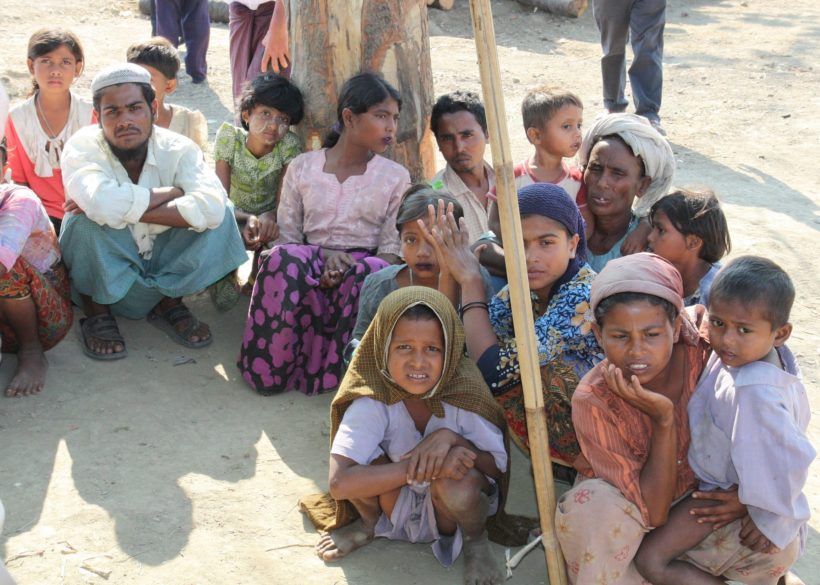by Hafizur Talukdar
Bangladesh is one of the most promising countries in the third world. In the long 50 years of independence, the country’s economy is growing rapidly today. But it is also a matter of concern that Bangladesh has serious problems such as the ebb and flow in development.
The Rohingya crisis is just such a challenging problem for present-day Bangladesh. Rohingyas have been persecuted from Myanmar at different times and have taken refuge in this country. Rohingyas living in Rakhine, Myanmar, fled to Bangladesh in 2017 to save their lives after being subjected to inhumane torture by their country’s army. According to various international organizations, there are currently 1.1 million Rohingya refugees in Bangladesh. However, the refugee crisis is not a new problem for Bangladesh. The repatriation of Rohingyas has been possible every time through diplomatic activities. But this time, the picture is different. Sustainable repatriation of Rohingyas has not yet been possible even after 5 years of the Rohingya crisis. In recent years, Bangladesh has embarked on a two-point repatriation process and has repeatedly failed.
Needless to say, in 2021, Sheikh Hasina’s government re-focused on Rohingya repatriation, but so far the Rohingya crisis has not been resolved due to weak diplomacy. In this case, increasing the alliance with the influential countries of the world may be one of the ways to repatriate the Rohingya. But the question is, will China, the forerunner of South Asia, stand by Bangladesh in Rohingya repatriation? We know that China has been doing 60-65 percent of its trade by sea for two decades. But in the near future, the sea crisis in China has made China’s sea trade uncertain. Thus, China wants to take the trade process forward by setting up pipelines by land as an alternative route. And China needs the state of Arakan in Myanmar to build this pipeline. That is why China is supporting Myanmar in the Rohingya repatriation. It cannot be said that China will speak on behalf of Bangladesh in the future as well.
On the other hand, Russia, one of the world’s superpowers, is closely involved in Myanmar politics. Russia currently has full support for Myanmar’s military rule. Because Myanmar is Russia’s largest arms market. Bangladesh, on the other hand, buys most of its military equipment from China and Turkey. At the recent international conference in Tashkent, Uzbekistan, the Russian Foreign Minister was told to stand by Bangladesh on the Rohingya issue, but Bangladesh did not get any green signal. So the hope of getting Russia on its side in the Rohingya crisis seems to be in jeopardy.
Bangladesh’s ally India also did nothing to help the Rohingya crisis. If India stands up for Bangladesh in Rohingya repatriation, India-Myanmar relations will come to a standstill. And India does not want bad relations with big energy-rich countries like Myanmar. On the other hand, another friendly country, Japan, is also silent today due to religious reasons.
The most surprising thing is that the worshipers of democracy are walking the path of the United States and Myanmar in the Rohingya crisis. The attitude of the United States in this regard is that if Bangladesh allows the United States to establish a military base in St. Martin, then this country of the first world will come forward on behalf of Bangladesh.
But history says that allowing the United States to establish bases means that Bangladesh is under the control of the United States. The repatriation of Rohingya is not being implemented mainly by powerful countries and international organizations giving importance to their geostrategic issues. On the other hand, creating a war situation with Myanmar to deal with this crisis can be suicidal for a developing country like Bangladesh.
So, only sustainable repatriation will be a lasting solution to the Rohingya problem. Analysts believe that if the Rohingya position is extended, Bangladesh will face security risks from various angles. Therefore, in sustainable repatriation, Bangladesh should gain the support of the world’s most influential countries, introduce strong diplomacy and continue its efforts to put pressure on Myanmar.
Bilateral diplomacy should be maintained for the repatriation of Rohingya without making excuses for the Coronavirus situation. Above all, the Rohingya crisis should be resolved in the interest of lasting peace and security in Bangladesh.
About the author:
Hafizur Talukdar. Currently, living in Dhaka city in Bangladesh. A school teacher and researcher who has completed honors and Master’s degree in the International Relations department in Dhaka University.






